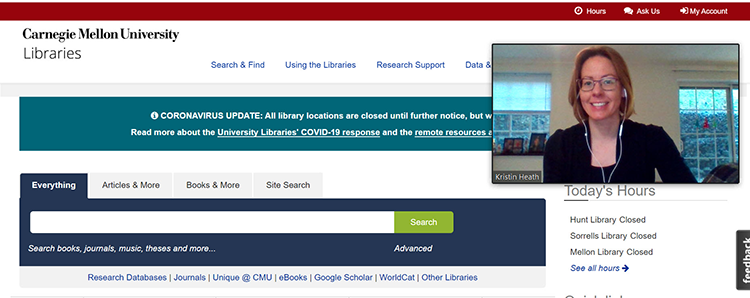
I was curious how our e-resources would support music teaching and learning when classes moved online. While the circumstances we are in right now are not ideal, they have forced me to look at how I use online resources differently and if they really are meeting needs of the School of Music.
Dr. Alexa Woloshyn, assistant professor of Musicology, sent me about twelve topics students were researching in her Music History III course so I could put our resources to the test. I spent time on each one and was able to find a good selection of online books and full-text journal articles for all of them.
My go-to music research databases are the library catalog, Worldcat, Grove Music Online, Music Index, RILM Music Abstracts, JSTOR, and ProQuest. In the past I would have bypassed the Everything tab on our library home page and gone straight for the Books & More option, but I found myself relying heavily on the Everything search for results (something students were already doing) since losing access to the print collection.
To help increase our online music score and research options, the University Libraries signed up for temporary access to the following databases:
- BabelScores is a French-based product offering contemporary music scores online. Trial ends April 30, 2020.
- Bloomsbury Popular Music
- Online Music Anthology is an extensive collection of music and articles designed expressly for music history and theory courses (from antiquity through the romantic era). Trial ends May 31, 2020.
- RIPM: Retrospective Index to Music Periodicals with Full Text (1760-1966)
- RIPM: Jazz Periodicals
There are many individuals, ensembles, orchestras, and opera companies creating new material or replaying past performances. Visit their websites to see what is freely available. Here are a few to get you started:
- Carnegie Mellon University School of Music Play-in-Place
- Musical America updates their list of over 100 free streams weekly. Consult their Industry News page to find the latest list.
- New York Phil Plays On
- Pittsburgh Symphony Orchestra 'Extraordinary Measures'
Zoom has been a helpful tool to share my screen and provide real-time library instruction. I have also used it to record short 2-5 minute 'how-to' videos as follow-up after a live session. I feel like there is an unusual opportunity to have students share their screens with me and be more hands-on with learning how to navigate while I talk them through it, but do they have the patience for this right now? I fell into my old pattern of showing them how to do everything from my screen rather than putting them in the driver seat when I recently worked with a couple of students one-to-one. It's something to experiment with going forward.
We already subscribe to many music databases for research, scores and parts online, and streaming music and videos. Check out my Music Research Guide for the latest information and feel free to reach out with any questions. Wishing you much peace during these changing times.
Kristin Heath
Music & Catalog Librarian
